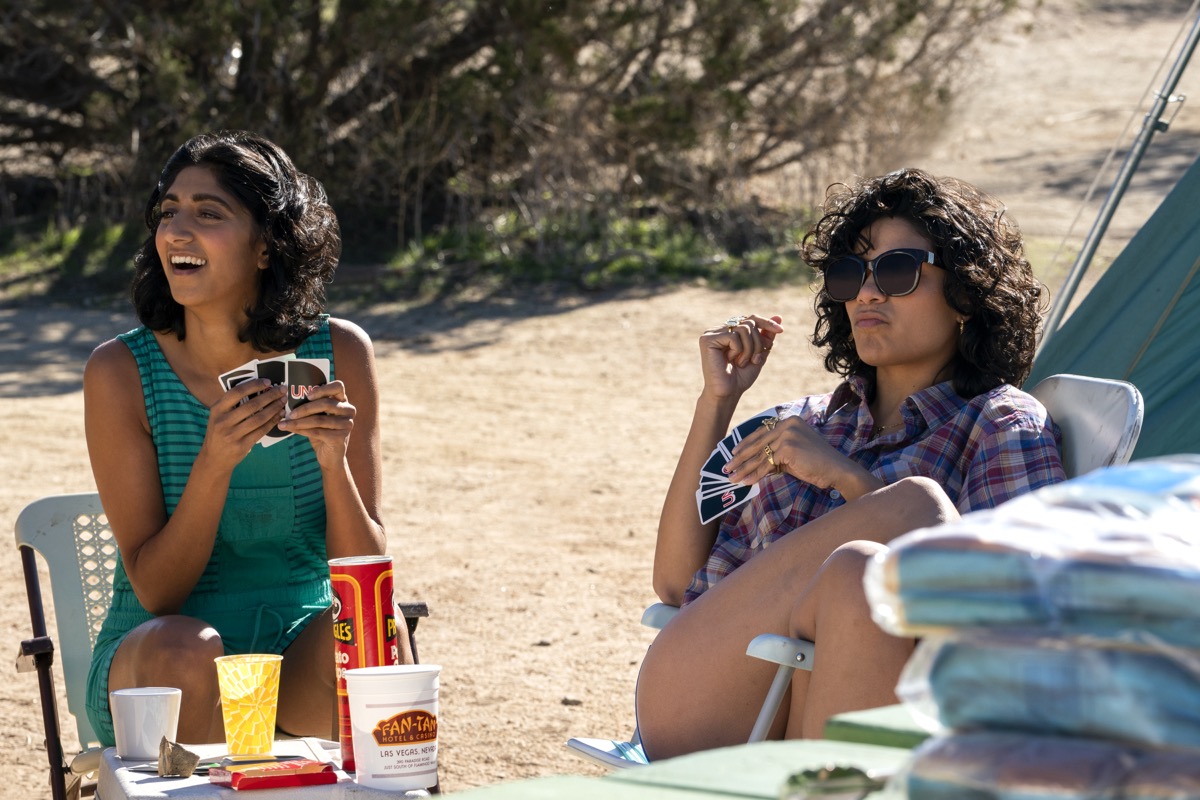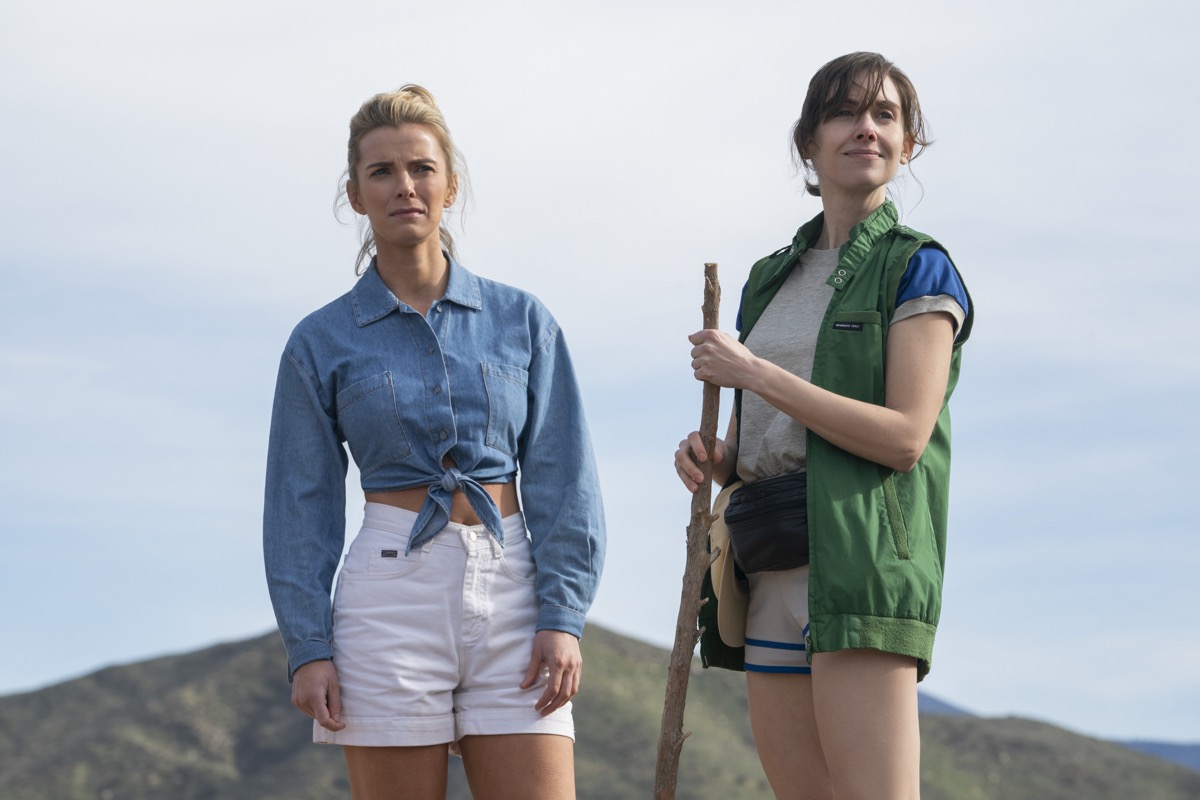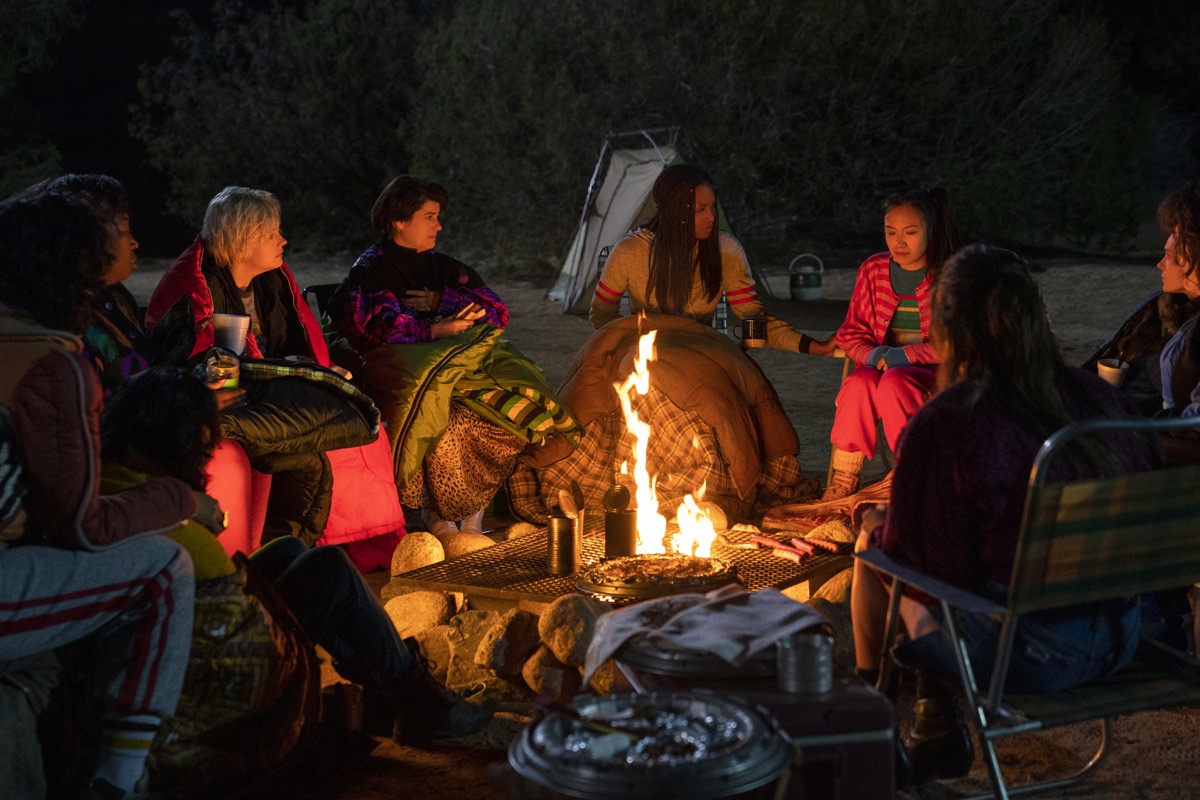GLOW’s Third Season Featured One of This Summer’s Best TV Episodes

**Spoilers for GLOW season 3.**
The best episode of this new season of the Netflix’s GLOW deals with unconscious bias, racism, and sexism, outside of the wrestling ring. The gorgeous ladies of wrestling have made an epic comeback with the show’s third season, set among the blinding lights and clinking slot machine sounds of Las Vegas, an ultimately uneven ride.
Despite a certain lack of direction, GLOW season 3 proved not to have missed a beat in grasping the complexity of womanhood. After the on-point MeToo storyline of season two, this new chapter of the female-focused series, created by Liz Flahive and Carly Mensch, delivered one of this summer’s best TV episodes—and it’s well outside of the wrestling ring.
Our ladies take a much-needed vacation when they hit Nevada’s Red Rock Canyon with an intense, albeit short, camping trip in “Outward Bound.” Starting as a chance for the girls to unwind, the Anya Adams-directed episode—the sixth of the season—ended up being more savage than any matches in the ring.
Flahive and Mensch penned the script, and they didn’t spare anything, addressing gender stereotypes, homophobia, and unconscious bias. Let’s unpack the different storylines of these jam-packed 42 minutes of television.
Ever since its pilot, GLOW has toyed with “political incorrectness.” The wrestling aliases played by the characters are generally oversimplified, overtly sexualized, racist, and sexist, which is not lost on the characters themselves. The only way they work out perfectly is that this stereotypical dimension is counterbalanced by the multifaceted nature of those real-life women who play them. Once they remove their makeup and jump out of their leotards, the characters embrace their complexity in the most candid way.
“Outward Bound” is a perfect example of this savage candidness. The audience doesn’t get to see the characters in their costumes, signaling what we’re about to hear is nothing but the truth—frills and glitter aside.
Even Sheila (Gayle Rankin, who might be up for an award for her work in this season), the only one who keeps her wolf costume in real life, significantly gets rid of it at the end of the episode. “It was getting in my way,” Sheila tells Ruth (Alison Brie), reiterating that a woman is so much more than how she appears on the outside.
Before that pivotal moment, the episode tackles three main topics—the sorts nobody wants to hear or talk about in the open.
Gender stereotypes are hard to smash. If you think that the world we’re living in is so much better than the not-so-fabulous ’80s the show is set in, you might want to think again. Debbie (Betty Gilpin) is confronted with the dilemma of whether to continue her work as producer and actor on the show or go home to be with her son Randy full-time. Some 30 years on, men are still rarely forced to make any crucial, potentially career-destroying decision like this one.
“I just hate them … they are just so free,” Debbie says of men.
Some might see this is just a man-hating rant, but that would ignore the root of the frustration that led to that snappy comment. Seeing her role constantly diminished by her male colleagues and facing her own sense of guilt for neglecting her family, Debbie is in a tricky position where she’s supposed to juggle her motherly and professional duties and still look amazing doing it. Mothers are people, too, and fathers should be granted longer paternity leave and take more responsibility—not just personally, but society should expect that of them, too.
“Outward Bound” also deals with another particularly uncomfortable topics, one that turns people into stubbornly self-justifying creatures: unconscious bias.
Addressing racism isn’t unlikely for a show whose characters in the ring are offensive clichés. Yet, this episode is probably the first instance in which GLOW discusses race and the implications of unconscious bias openly and compellingly, aside from throwaway remarks meant to assure the audience that the show is also aware of these issues.
Best friends Melanie, a.k.a. Melrose (Jackie Tohn), and Jenny (Ellen Wong) are going through a hard time after the former played an excessively caricatured, racist version of Fortune Cookie, Jenny’s wrestling persona, during a character-switching match.
What’s most striking about the conflict is that Melrose is completely oblivious to her actions and words, and the way they hurt Jenny. “We’re best friends … I’m not some fucking random white girl,” Melrose tells Jenny, in a poor attempt to smooth things over.
Cosied up around the campfire, the women have a Jewish Passover Seder, following Melrose’s suggestion, in a bid to mend things with Jenny. Melrose’s retelling of the story of Jewish people escaping slavery in ancient Egypt is an opportunity for the rest of the ladies to reflect on their own identities.
Both Melrose and Jenny give deep insight into how discrimination and persecution have impacted their people, with Melrose realizing how racist it was to play Fortune Cookie the way she did.
Alas, not only can friends be racist, but they can be homophobic, biphobic and transphobic, as well.
Fan-favorite queer couple Arthie (Sunita Mani) and Yolanda (Shakira Barrera) have an unpleasant exchange with Dawn (Rebekka Johnson) and Stacey (Kimmy Gatewood).
Discussing switching characters permanently, Stacey suggests she could play Arthie’s character—yet another racist cliché, Beirut—but she wouldn’t want to wrestle Yolanda, as she’d be more comfortable with a straight opponent. Later that night, Arthie tries to laugh it off and shows some doubt of her own sexual orientation. Yolanda, who has been out for a long time and knows better than her girlfriend, breaks an uneasy truth to Arthie.
“Your friends disappointing you? This is the type of shit you have to deal with when you’re gay,” Yolanda says.
Away from Vegas, these gorgeous ladies couldn’t be more different from their wresting characters, as they finally have the chance to put themselves into their friends’ boots.
This season’s peak, “Outward Bound” is great in showing that the people we love, too, can say hurtful, racist, homophobic things—that we can ourselves. The key is to acknowledge, apologize, and learn the lesson, rather than get annoyingly defensive.
(images: Ali Goldstein/Netflix)
Stefania Sarrubba is an Arts and Culture journalist based in London. When she is not adding movies she will probably never see to her infinite watchlist, she likes spotting urban foxes, making plans and engaging in passionate conversations about women’s rights. Read her annoying tweets on @freckledvixen.
Want more stories like this? Become a subscriber and support the site!
—The Mary Sue has a strict comment policy that forbids, but is not limited to, personal insults toward anyone, hate speech, and trolling.—
Have a tip we should know? [email protected]

